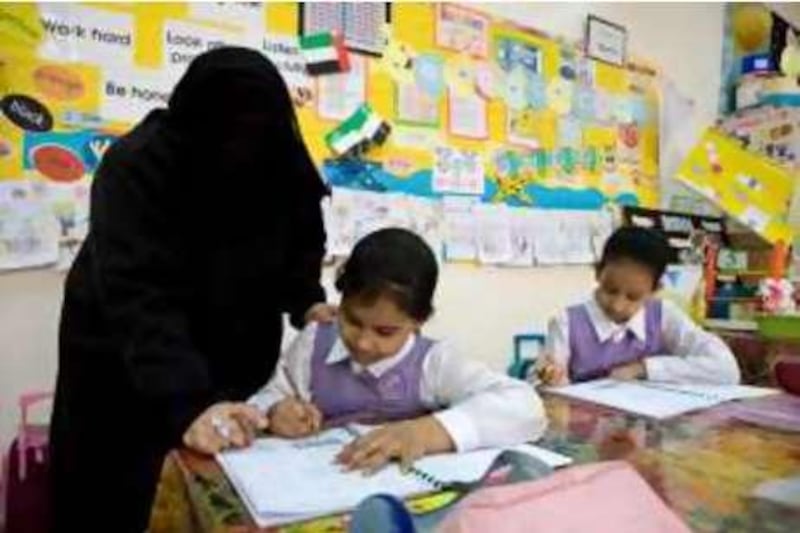For years, public schools have used a curriculum designed by the Ministry of Education that relied heavily on rote memorisation and tested the ability of pupils to dictate answers drawn from textbooks. But if the Ministry of Education succeeds with its new strategy, pupils will be learning in a completely new way. The Abu Dhabi Education Council (ADEC) curriculum sets aside memorisation in favour of problem solving and critical thinking. Instead of being tested on specific pieces of information that have been memorised, pupils will be expected to have certain skills at the end of each grade, be they in maths, science, English or physical education. "The standards defined what you expect teachers to teach, but perhaps more importantly what you expect students to be able to know and be able to do after a set period of time," said Paul Doorn, manager of the public private partnership (PPP) programme at ADEC. "It standardises the system's expectations for students. The other thing that it does really well is it starts allowing for greater consistency across the schools." More than 40 per cent of Emirati parents have turned their backs on public schools and enrolled their children in private schools, according to the Ministry of Education, many of them especially concerned about English instruction. Pupils from the public school system, where the primary language of instruction is Arabic, are often ill-prepared for state universities where courses are taught in English. As a result, many Emirati students take five to six years to complete their university degrees instead of the traditional four. About a third of the teaching budget in federal universities is allocated to foundation courses, which are designed to compensate for the failure of public schools to prepare undergraduates. The country's failing public school system has long been a top priority for the government, which pours Dh7 billion (US$1.9bn) into the Ministry of Education each year. In the late 1990s, a former education minister, Dr Abdel Aziz al Sharian, embarked on a programme to overhaul the school system. But his 2020 plan was ultimately scrapped; later, when Dr Hanif Hassan was appointed, reform was back on the agenda. As director general of the ADEC, Dr Hassan had helped to create the council's standards and the PPP programme. The new ADEC curriculum standards, which were developed by Technical and Further Education Global, a branch of the New South Wales Department of Education and Training, were rolled out three years ago in Abu Dhabi's 142 PPP and Model schools. Standards were set in subjects such as creative arts, information and communications technologies, and business studies, in addition to more traditional subjects such as maths, science and English. Now the curriculum will be introduced nationwide in stages, beginning with training teachers and writing new textbooks. "The biggest change surrounds the content and the way its delivered," said Dr Richard Siler, head of the curriculum department at the ADEC. "The classic teaching method is to lecture, with the teacher at the front. The teacher is the expert, directing everything in the classroom, and the students are sitting passively, listening or doing work in an exercise book." Under the new curriculum the child is at the centre of the learning process. "The teacher is still the director," said Dr Siler, "but the students are actively doing things, trying to discover things, that's the big shift". "What they referred to as the curriculum was simply the content of a textbook," he said. "Once the book was chosen then they would decide what it was students should learn, but it had to be in the book. We come at it from a different way: let's get that well mapped out. Once we've got that mapped out, then let's look for resources that can help us get there." By the end of kindergarten, for example, pupils studying in the new curriculum should know how to count to 30 and read, order and use up to 20 numbers, words, symbols and objects. By the end of grade five, they should know how to read, write and order numbers to at least five digits. By grade seven, they are expected to speak clearly on familiar subjects and be able to express ideas and feelings in writing. By the next year, they should be able to describe geological processes, and identify the importance of the cellular processes of respiration, photo synthesis, osmosis and diffusion by plants and animals. By grade nine, they should be able to identify major developments in the political, social and cultural history of the UAE. According to Dr Siler, the new curriculum should improve student achievement. "If I know how to problem-solve in groups with colleagues, I have a far greater skill than a bunch of facts stuffed in my head," he said. "Getting the information is not difficult, using it is important and that's the change really. We're trying to reach students to use information rather than just collecting it." The transition to the new system in Abu Dhabi schools has so far proven a major challenge for teachers, requiring much more planning and assessing outside the classroom, said Dr Siler, adding it has been harder for some than others. Indeed, the transition is likely to prove a challenge to many. "People who see teaching as an authoritarian activity, people who see the teacher as the most important person in the learning process, have great difficulty," he said. klewis@thenational.ae
A problem-solving approach
New education reforms are based on replacing rote memorisation with child-centred education.

More from the national





